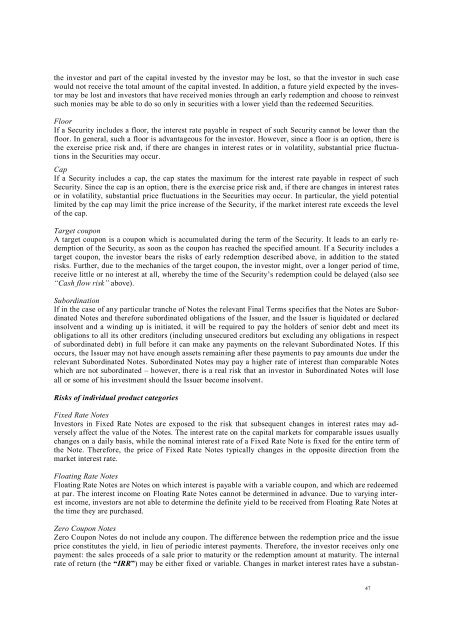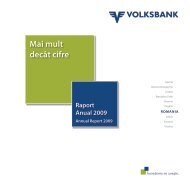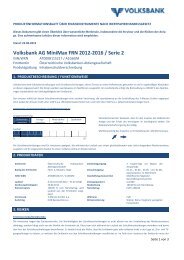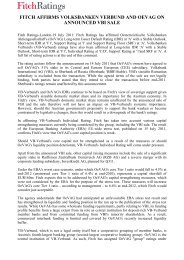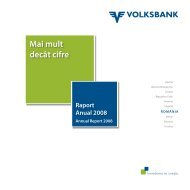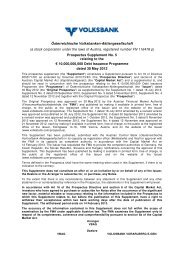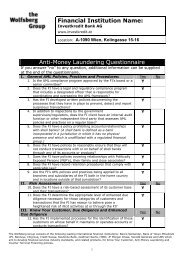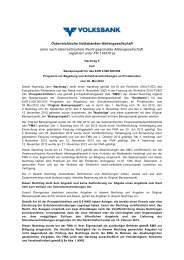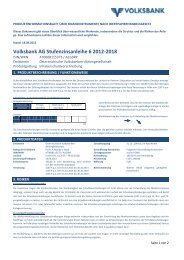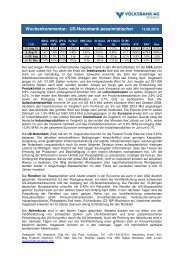I This document constitutes the base prospectus of ... - Volksbank AG
I This document constitutes the base prospectus of ... - Volksbank AG
I This document constitutes the base prospectus of ... - Volksbank AG
You also want an ePaper? Increase the reach of your titles
YUMPU automatically turns print PDFs into web optimized ePapers that Google loves.
<strong>the</strong> investor and part <strong>of</strong> <strong>the</strong> capital invested by <strong>the</strong> investor may be lost, so that <strong>the</strong> investor in such case<br />
would not receive <strong>the</strong> total amount <strong>of</strong> <strong>the</strong> capital invested. In addition, a future yield expected by <strong>the</strong> investor<br />
may be lost and investors that have received monies through an early redemption and choose to reinvest<br />
such monies may be able to do so only in securities with a lower yield than <strong>the</strong> redeemed Securities.<br />
Floor<br />
If a Security includes a floor, <strong>the</strong> interest rate payable in respect <strong>of</strong> such Security cannot be lower than <strong>the</strong><br />
floor. In general, such a floor is advantageous for <strong>the</strong> investor. However, since a floor is an option, <strong>the</strong>re is<br />
<strong>the</strong> exercise price risk and, if <strong>the</strong>re are changes in interest rates or in volatility, substantial price fluctuations<br />
in <strong>the</strong> Securities may occur.<br />
Cap<br />
If a Security includes a cap, <strong>the</strong> cap states <strong>the</strong> maximum for <strong>the</strong> interest rate payable in respect <strong>of</strong> such<br />
Security. Since <strong>the</strong> cap is an option, <strong>the</strong>re is <strong>the</strong> exercise price risk and, if <strong>the</strong>re are changes in interest rates<br />
or in volatility, substantial price fluctuations in <strong>the</strong> Securities may occur. In particular, <strong>the</strong> yield potential<br />
limited by <strong>the</strong> cap may limit <strong>the</strong> price increase <strong>of</strong> <strong>the</strong> Security, if <strong>the</strong> market interest rate exceeds <strong>the</strong> level<br />
<strong>of</strong> <strong>the</strong> cap.<br />
Target coupon<br />
A target coupon is a coupon which is accumulated during <strong>the</strong> term <strong>of</strong> <strong>the</strong> Security. It leads to an early redemption<br />
<strong>of</strong> <strong>the</strong> Security, as soon as <strong>the</strong> coupon has reached <strong>the</strong> specified amount. If a Security includes a<br />
target coupon, <strong>the</strong> investor bears <strong>the</strong> risks <strong>of</strong> early redemption described above, in addition to <strong>the</strong> stated<br />
risks. Fur<strong>the</strong>r, due to <strong>the</strong> mechanics <strong>of</strong> <strong>the</strong> target coupon, <strong>the</strong> investor might, over a longer period <strong>of</strong> time,<br />
receive little or no interest at all, whereby <strong>the</strong> time <strong>of</strong> <strong>the</strong> Securitys redemption could be delayed (also see<br />
Cash flow risk above).<br />
Subordination<br />
If in <strong>the</strong> case <strong>of</strong> any particular tranche <strong>of</strong> Notes <strong>the</strong> relevant Final Terms specifies that <strong>the</strong> Notes are Subordinated<br />
Notes and <strong>the</strong>refore subordinated obligations <strong>of</strong> <strong>the</strong> Issuer, and <strong>the</strong> Issuer is liquidated or declared<br />
insolvent and a winding up is initiated, it will be required to pay <strong>the</strong> holders <strong>of</strong> senior debt and meet its<br />
obligations to all its o<strong>the</strong>r creditors (including unsecured creditors but excluding any obligations in respect<br />
<strong>of</strong> subordinated debt) in full before it can make any payments on <strong>the</strong> relevant Subordinated Notes. If this<br />
occurs, <strong>the</strong> Issuer may not have enough assets remaining after <strong>the</strong>se payments to pay amounts due under <strong>the</strong><br />
relevant Subordinated Notes. Subordinated Notes may pay a higher rate <strong>of</strong> interest than comparable Notes<br />
which are not subordinated however, <strong>the</strong>re is a real risk that an investor in Subordinated Notes will lose<br />
all or some <strong>of</strong> his investment should <strong>the</strong> Issuer become insolvent.<br />
Risks <strong>of</strong> individual product categories<br />
Fixed Rate Notes<br />
Investors in Fixed Rate Notes are exposed to <strong>the</strong> risk that subsequent changes in interest rates may adversely<br />
affect <strong>the</strong> value <strong>of</strong> <strong>the</strong> Notes. The interest rate on <strong>the</strong> capital markets for comparable issues usually<br />
changes on a daily basis, while <strong>the</strong> nominal interest rate <strong>of</strong> a Fixed Rate Note is fixed for <strong>the</strong> entire term <strong>of</strong><br />
<strong>the</strong> Note. Therefore, <strong>the</strong> price <strong>of</strong> Fixed Rate Notes typically changes in <strong>the</strong> opposite direction from <strong>the</strong><br />
market interest rate.<br />
Floating Rate Notes<br />
Floating Rate Notes are Notes on which interest is payable with a variable coupon, and which are redeemed<br />
at par. The interest income on Floating Rate Notes cannot be determined in advance. Due to varying interest<br />
income, investors are not able to determine <strong>the</strong> definite yield to be received from Floating Rate Notes at<br />
<strong>the</strong> time <strong>the</strong>y are purchased.<br />
Zero Coupon Notes<br />
Zero Coupon Notes do not include any coupon. The difference between <strong>the</strong> redemption price and <strong>the</strong> issue<br />
price <strong>constitutes</strong> <strong>the</strong> yield, in lieu <strong>of</strong> periodic interest payments. Therefore, <strong>the</strong> investor receives only one<br />
payment: <strong>the</strong> sales proceeds <strong>of</strong> a sale prior to maturity or <strong>the</strong> redemption amount at maturity. The internal<br />
rate <strong>of</strong> return (<strong>the</strong> IRR) may be ei<strong>the</strong>r fixed or variable. Changes in market interest rates have a substan-<br />
47


